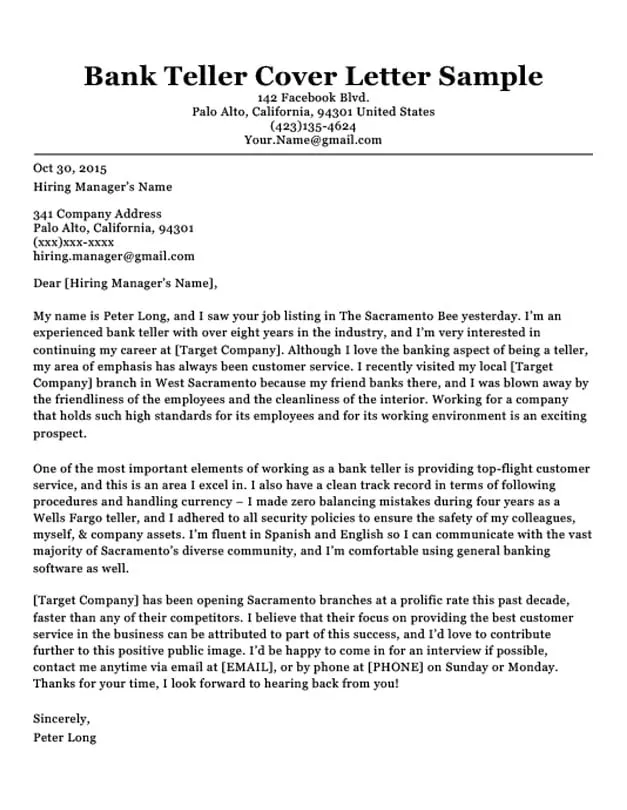What is a Bank Teller Cover Letter
A bank teller cover letter is a crucial document that accompanies your resume when applying for a bank teller position. It serves as your first introduction to the hiring manager, providing an opportunity to showcase your personality, skills, and enthusiasm for the role. Unlike a resume that lists your qualifications, a cover letter allows you to elaborate on your experiences, explain why you’re a great fit for the bank, and express your genuine interest in the job. Think of it as your personal sales pitch, highlighting the value you bring to the table and persuading the employer to consider you further. A well-written cover letter can significantly increase your chances of getting an interview and ultimately landing the job. Remember, a generic cover letter is easily spotted and often dismissed, so personalize it and make it shine. Make sure that you are tailoring your cover letter to each specific bank and position you are applying for to increase your chances of success.
Why a Cover Letter is Essential for a Bank Teller
In a competitive job market, a cover letter is essential for bank teller positions. It’s your chance to stand out from other applicants and demonstrate why you’re the perfect fit. Firstly, it allows you to expand on your resume, providing context and depth to your experiences. Secondly, it offers the opportunity to highlight specific skills and achievements that align with the job requirements. Thirdly, it shows your enthusiasm and genuine interest in the bank and the specific role. By taking the time to craft a compelling cover letter, you demonstrate professionalism, attention to detail, and a willingness to go the extra mile. This demonstrates to the hiring manager that you are serious about the position and that you have taken the time to understand the bank’s needs. A strong cover letter also provides an opportunity to address any potential concerns, such as gaps in employment or a change in career direction. Finally, it allows you to showcase your personality and communication skills, which are vital for a customer-facing role like a bank teller.
Highlighting Your Skills for the Role
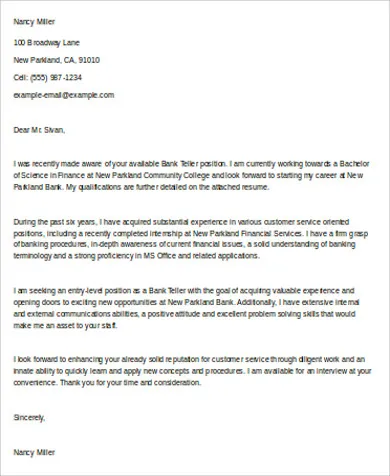
When writing your bank teller cover letter, it’s crucial to highlight the skills that make you a strong candidate. Focus on abilities that directly relate to the responsibilities of a bank teller, such as customer service, attention to detail, and communication. Remember, the cover letter is where you can provide specific examples of how you’ve demonstrated these skills in past roles or experiences. Instead of just stating you have these skills, provide evidence. Quantify your achievements whenever possible; for instance, mention how you handled a certain number of customer transactions per day or how you consistently exceeded customer satisfaction goals. Use action verbs to describe your accomplishments. Examples of action verbs include ‘managed’, ‘assisted’, ‘resolved’, ‘processed’, and ‘maintained.’ This will paint a vivid picture of your capabilities for the hiring manager. Make sure you tailor your skills to the bank’s requirements, as each bank has its own specific expectations.
Key Skills to Showcase
Customer Service Skills
Customer service is at the heart of a bank teller’s role. Showcase your ability to interact positively with customers, resolve their issues, and provide excellent service. Highlight any experience you have in customer-facing roles, whether it’s in retail, hospitality, or other service-oriented industries. Detail instances where you went above and beyond to assist customers. For example, did you resolve a complex issue, assist a customer, or successfully handle a difficult situation? Mention any customer service training you’ve received or certifications you hold, such as those related to conflict resolution. Emphasize your ability to remain calm under pressure, handle complaints, and provide friendly and efficient service. Highlight your active listening skills and your ability to understand and meet the needs of diverse customers. Provide details about how you are able to anticipate customer needs and offer proactive solutions.
Attention to Detail
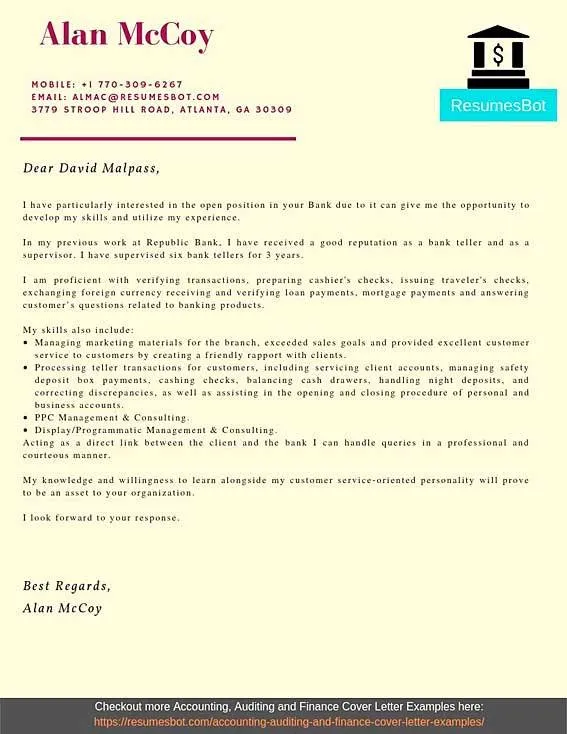
Bank tellers handle financial transactions, making accuracy and attention to detail essential. Highlight your ability to handle money, balance accounts, and follow procedures precisely. Emphasize your experience in environments where accuracy is critical, such as data entry, accounting, or administrative roles. Mention any training or experience in handling cash and reconciling transactions. Give specific examples of how you have ensured accuracy in your past roles. This could include your ability to maintain meticulous records or to catch errors before they become problems. Highlight your ability to follow strict guidelines and procedures, which will give the hiring manager the confidence in your work ethic. Demonstrate your commitment to accuracy through specific examples of your experience, and show how you ensure accuracy in your work to avoid potential financial discrepancies and maintain customer trust.
Communication Skills
Effective communication is crucial for bank tellers, who interact with customers and colleagues. Highlight your ability to communicate clearly and concisely, both verbally and in writing. Mention your experience in explaining complex information in a simple way, such as explaining financial products to customers. Include any public speaking experience, presentation skills, or experience in training others. Provide examples of how you’ve handled difficult conversations or resolved customer complaints. Show off your ability to listen actively and understand customer needs. Demonstrate your ability to communicate effectively with a diverse range of people. Highlight your ability to work collaboratively with team members and communicate effectively with supervisors and managers. Mention any experience with communicating through different channels, such as phone, email, and face-to-face interactions.
Formatting Your Bank Teller Cover Letter
Formatting is key to creating a professional and visually appealing cover letter. Use a clean and readable font like Times New Roman or Arial, with a font size between 10 and 12 points. Keep the layout organized with clear headings, bullet points, and plenty of white space. Use one-inch margins on all sides. Aim for a one-page document, keeping it concise and focused. Proofread carefully for any typos or grammatical errors. Use a professional tone throughout the letter. Make sure to use the correct salutation, address the hiring manager by name if possible, and maintain a respectful and polite tone. Stick to the recommended length of one page. Always tailor the letter to the specific job and bank.
Contact Information and Date
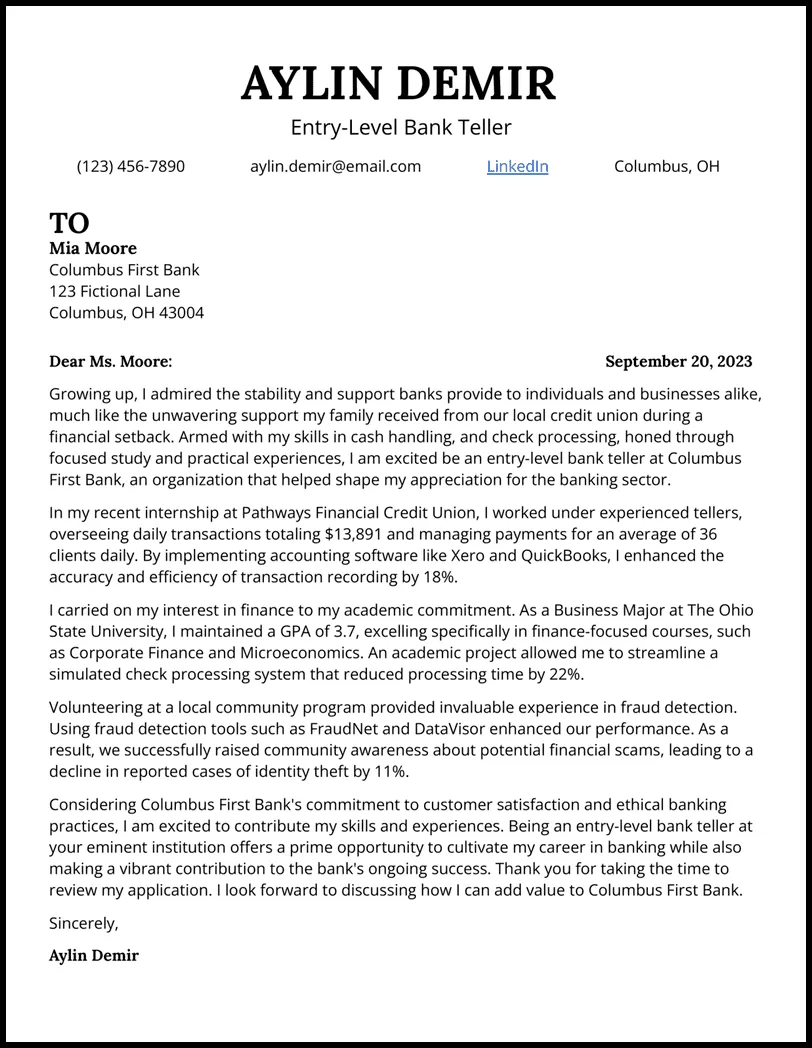
Start your cover letter by including your contact information at the top of the page, including your name, address, phone number, and email address. Include the date directly beneath your contact information. Following this information, include the hiring manager’s name, title, and the bank’s address. Make sure the information is accurate, and confirm that you have the correct recipient before submitting your letter. This ensures that your application is delivered to the correct person. Ensure your contact information is up-to-date to facilitate communication.
Greeting and Introduction
Begin your cover letter with a professional greeting, such as ‘Dear Mr./Ms. [Last Name]’. Research the hiring manager’s name and address them directly. If you cannot find the hiring manager’s name, use a general greeting such as ‘Dear Hiring Manager’. In the introduction, state the position you’re applying for and how you learned about the opportunity. Briefly mention your key qualifications and your enthusiasm for the role. This sets the tone for the rest of the letter and captures the reader’s attention immediately. Make a strong opening statement that will engage the reader and make them want to learn more about you. Avoid generic openings and make your introduction engaging and relevant to the specific bank and position you’re applying for.
Body Paragraphs
The body of your cover letter is where you elaborate on your skills and experiences, providing specific examples to support your claims. Each paragraph should focus on a specific skill or achievement related to the bank teller role. Use the STAR method (Situation, Task, Action, Result) to provide context, describe your role, detail the actions you took, and highlight the outcomes. Quantify your achievements whenever possible, using numbers or percentages to demonstrate your impact. Tailor each paragraph to the specific requirements of the job description. Keep the tone professional and enthusiastic, and show that you’ve researched the bank and understand its values. Demonstrate your accomplishments and explain how your experiences align with the bank’s needs and expectations.
Closing and Call to Action
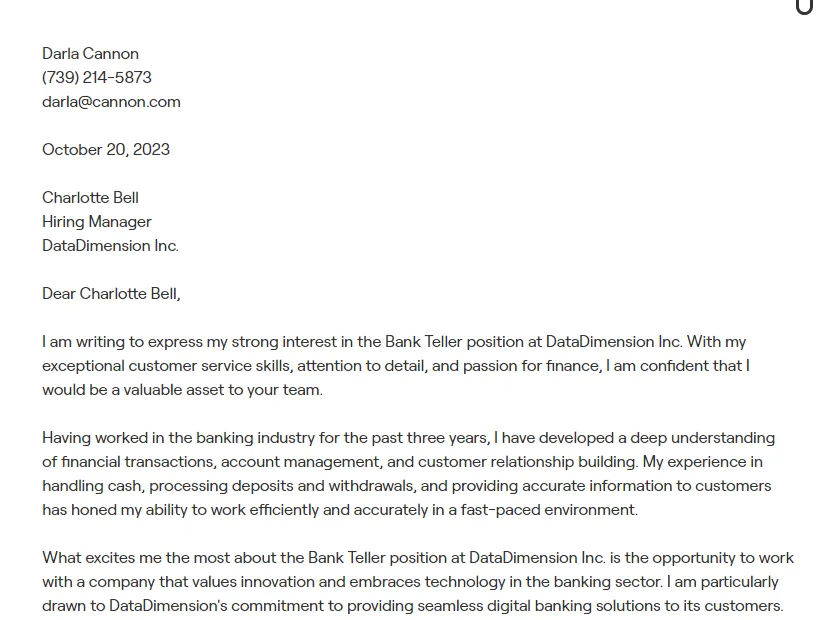
In your closing paragraph, reiterate your interest in the position and thank the hiring manager for their time and consideration. Include a call to action, such as stating that you’re available for an interview and look forward to hearing from them soon. This shows initiative and enthusiasm. Reiterate your commitment and express your eagerness to learn more about the opportunity. Restate your interest in the role and express your confidence in your ability to contribute to the bank’s success. Use a professional closing, such as ‘Sincerely’ or ‘Best regards,’ followed by your typed name. Ensure you have the correct contact information.
Cover Letter Examples Bank Teller
Entry-Level Bank Teller Cover Letter Example
When applying for an entry-level bank teller position, focus on highlighting any customer service experience, even if it’s not directly related to banking. Showcase your skills in handling cash, following procedures, and communicating effectively. Mention any relevant coursework or training you’ve completed, such as accounting or finance courses. Demonstrate your enthusiasm for the banking industry and your willingness to learn and grow. If you’re a recent graduate, emphasize your academic achievements and any relevant extracurricular activities. Tailor your letter to the specific requirements of the job description, emphasizing your commitment to customer service and your desire to build a career in banking. Provide examples of your reliability, responsibility, and willingness to learn new skills.
Experienced Bank Teller Cover Letter Example
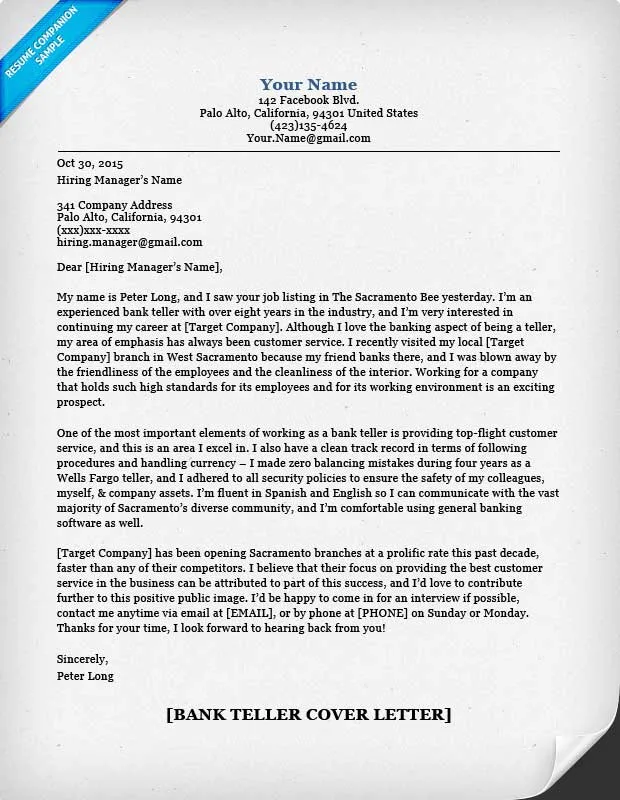
For experienced bank tellers, focus on highlighting your accomplishments and quantifiable results. Provide specific examples of how you’ve exceeded customer expectations, resolved complex issues, or improved efficiency. Emphasize your knowledge of banking products and services, as well as your proficiency in using banking software and systems. Demonstrate your leadership skills by mentioning any experience you have in training or mentoring other tellers. Include details about any special projects you’ve managed or any initiatives you’ve led to improve customer service. Tailor your letter to the bank’s specific needs, showcasing your ability to contribute to their success. Highlight your years of experience in banking, emphasizing your expertise in handling various transactions and providing excellent customer service.
Tips for Writing a Compelling Cover Letter
Tailoring Your Letter to the Bank
Customizing your cover letter for each bank is crucial for demonstrating your interest and understanding of their specific needs. Research the bank’s mission, values, and culture. Review the job description carefully and use keywords from the description in your cover letter. Highlight the skills and experiences that align with the bank’s requirements. Reference specific programs, initiatives, or values that resonate with you. This shows that you’ve taken the time to understand the bank and its operations. Tailor your letter to the bank’s specific requirements, highlighting your understanding of their products, services, and customer base. Focus on the requirements and the culture of the specific bank. Make sure to highlight the reasons why you are a good fit for their organization.
Proofreading and Editing
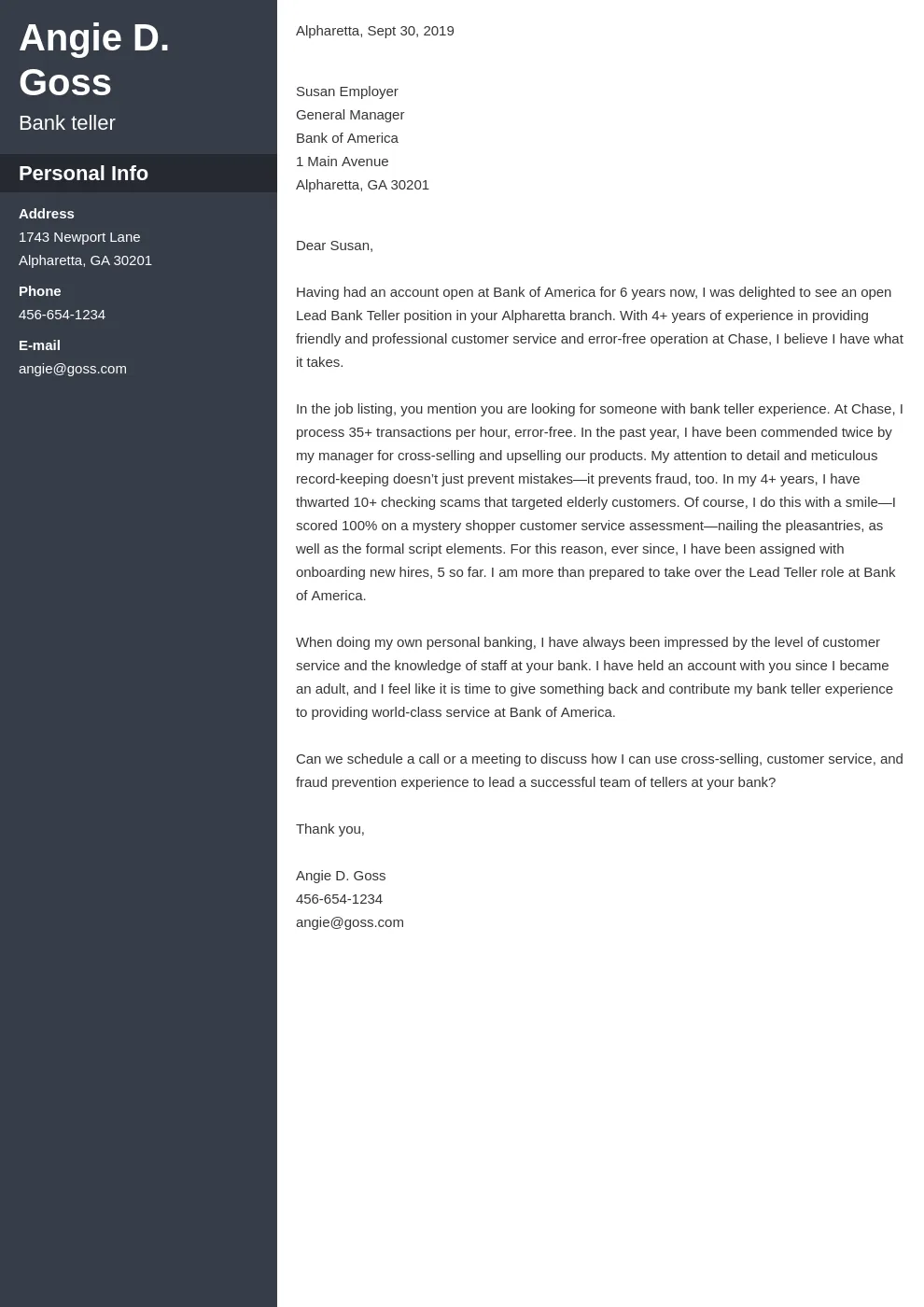
Before submitting your cover letter, meticulously proofread and edit it to eliminate any typos, grammatical errors, or formatting inconsistencies. Ask a friend, family member, or career counselor to review your letter. Check for clarity, conciseness, and professionalism. Ensure your language is clear, concise, and easy to understand. The cover letter is a reflection of your attention to detail, so make sure it is error-free. Ensure that the formatting is consistent and visually appealing. Always use spell check and grammar check, but also read the letter aloud to catch any awkward phrasing or errors. Proofreading and editing will ensure that you present a polished and professional image.
Highlighting Relevant Experience
When describing your experience, focus on the skills and accomplishments that are most relevant to the bank teller role. Provide specific examples of how you’ve demonstrated customer service, attention to detail, and communication skills. Quantify your achievements whenever possible, such as the number of transactions you handled per day or the percentage of customer satisfaction. If you have experience in a similar role, such as a cashier or customer service representative, highlight the transferable skills. Frame your experiences in a way that shows how you can bring value to the bank. Give details about your experience, emphasizing the skills you acquired and the results you achieved. Make sure your descriptions are concise, clear, and easy to understand.
What to Avoid in Your Cover Letter
Avoid using generic or vague language. Do not simply restate your resume. Steer clear of typos, grammatical errors, and formatting mistakes. Don’t include irrelevant information. Avoid negative language or criticizing previous employers. Do not send a cover letter that is too long or too short. Avoid using overly casual language. Don’t make unrealistic claims or exaggerate your qualifications. Do not focus on what you want from the job; instead, focus on what you can offer the bank. Make sure you do not send a cover letter that is not tailored to the bank or position. Avoid any negative statements about previous employers or colleagues. Make sure you maintain a professional tone and avoid casual language.
